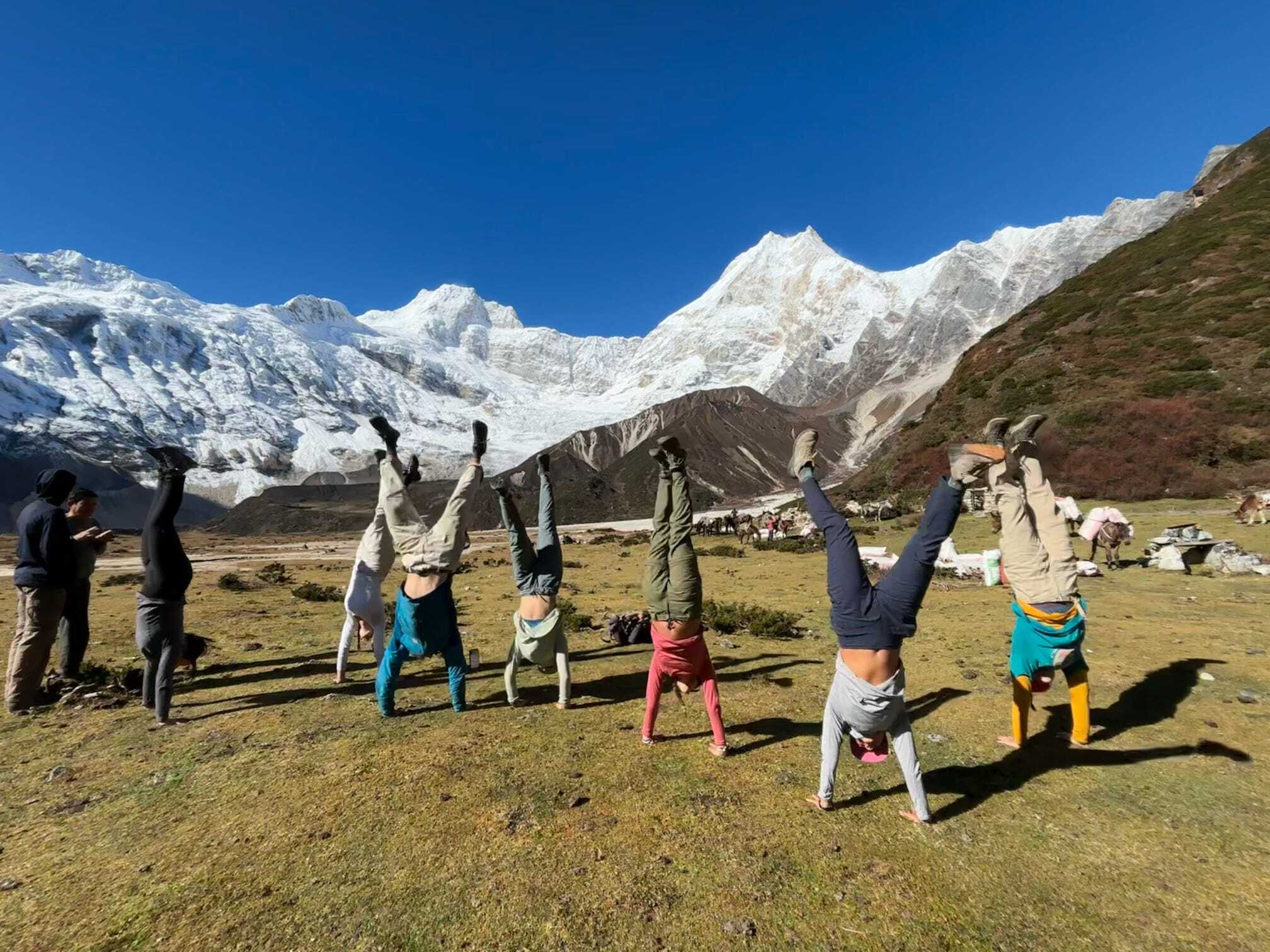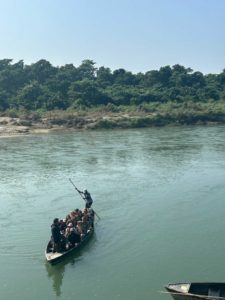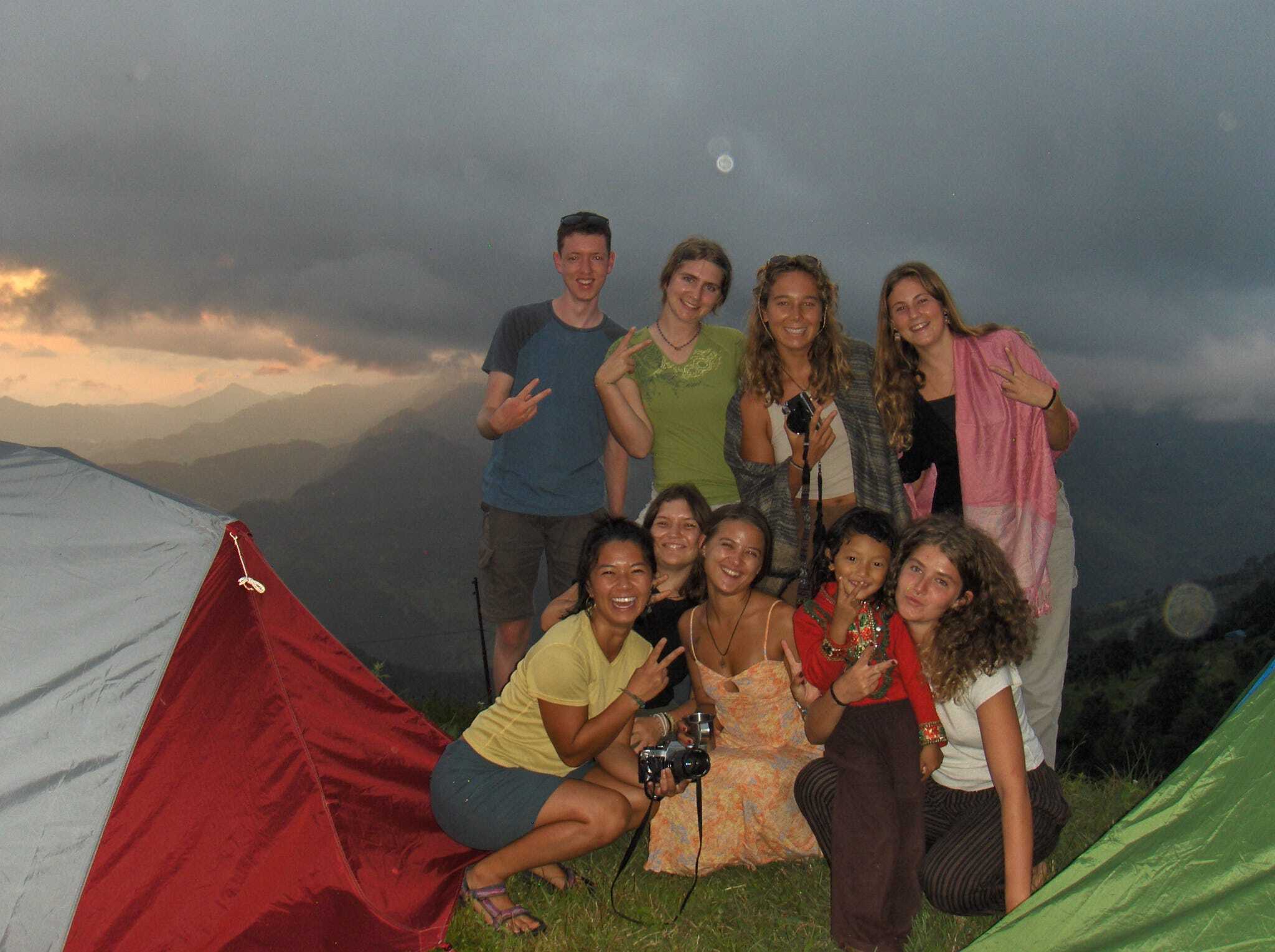Katy Nicholas poses in front of a remote hillside view during her study abroad trip in Nepal. (Courtesy of Katy Nicholas)
By Katy Nicholas
March 15, 2025 at 10:02 p.m.
The sound of rain bouncing off the metallic wings overtakes the sound of the jet engine. Instead of city lights and the Santa Monica Mountains, the Himalayas rise up around the plane, dwarfing my perception of altitude.
Katy, you’re not at LAX anymore.
Six months ago, I applied to the Wildlands Studies program on a whim. Now, I am en route to Nepal, where I will be backpacking and trekking for six weeks straight.
I have never backpacked before. I have never been to Asia before. I don’t know anyone in my program or the whole country of Nepal. With these prerequisites, I, for some reason, thought it would be a fantastic idea to sign myself up.

As I wander the small airport alone – my green nylon backpack weighing more than me – I start to wonder if it was really the best idea after all. Little did I know that participating in this program would test my limits in ways that I would have never imagined – forever reshaping my worldview.
It is 1 a.m. when I finally get off the plane, but the hours and days have faded into each other during my trip across the globe. I arrived after the rest of my group because of some delays with my flights. I feel vulnerable as a solo female traveler in such an unknown place. My anxiety is peaking – the same goes for my parents, who have consistently texted me every other minute since I left.
I go through immigration and pay for my visa, the agent smiling and asking what brings me to Nepal.
“I hope you enjoy. Our country is the best,” he bids me farewell as I walk through to baggage claim.
As I wait for my duffle bag, I look in my passport to text my visa number to my professor. As I flip to the page, I notice it says “24 hour visa.” My heart drops. My emotions fume. My travel day has been so tumultuous already – this is the last thing I need. I can’t believe the immigration worker made this mistake. Now, I have to go back and set it straight.
I find someone that looks like he is in charge and explain the situation.
“They gave me the wrong visa type,” I frantically described. “I’m here for six weeks, not a day!”
There is both an edge and a hint of panic in my voice, so the worker goes back to the visa desk and tries to straighten it out. I am annoyed. I am tired and hungry and annoyed that a mistake like this could have been made. I am ready to yell at someone when the worker comes back with my passport.
He smiles. He flips to the back of the book and points to my Nepal visa. Ninety days. Before, I was looking at the Qatar visa, where my layover had been. It was my mistake.
I am embarrassed, to say the least. I try to cool down as I walk outside to get a cab.
Since there are no Ubers in Nepal, I worried about transportation to my hotel across the city alone and in the middle of the night. But as I walked out of the terminal, I was immediately greeted by a cab. I was up and out of the airport within 30 seconds. I wish LAX had this service.
The drive through the city is smooth until we get to Thamel, a touristy neighborhood where most foreign trekkers stay before they depart. Here the streets are narrow, and the line of cars is thick. There are hundreds of people on mopeds and more walking the streets. Finally arriving at my hotel, I drift off to sleep to the melody of distant clubs and honks, wondering what tomorrow will bring me.
…
“Good morning! Would you like to have some tea?”
It is 6 a.m. on the thirteenth day of the trek. We are at an elevation of 3,300 meters at a Tibetan nunnery in the Tsum Valley of the Himalayas. Every morning, our guides wake us up in our tents and bring us hot tea before we enjoy a shared breakfast in the dining tent.
Before eating, I step outside. I find myself surrounded by snowy peaks that glisten in the sunrise. The chilly air is cut by the powerful rays of the sun, which burn in a perfectly blue sky. Flowers of every color are bursting through old wooden fences, bees resting on their fragrant petals. I admire the view’s beauty, which leaves me with a newfound feeling of awe with the Earth that I didn’t know was possible.

Today is a layover day, which means we are staying at the same camp. On other days, we trek between 12 and 26 miles to different campsites, gradually approaching our final goal of Larkya-La Pass near Manaslu Mountain. We have class everyday after trekking, and our free time is dominated by group research projects.
My research project is on the effects of climate change on local people. I interview local people to learn about their lives and how their livelihoods are affected by tourists and technology. As I work, I find irony in being one of those tourists, part of the problem I am trying to research.
After demolishing a bowl of porridge topped with a whole cup of peanut butter, the group passes through a courtyard to the nunnery, where we’ll be conducting interviews with an in-residence nun in between her daunting schedule of sustenance farming, conducting spiritual rituals and hosting trekkers.
We huddled around a woman we called “Didi,” which is the term for “older sister” that younger women traditionally call older women in Nepal. The 48-year-old has a clean buzzed scalp, a simple red cloak and black Crocs. We sit in the entrance to the stupa and first try to make Didi comfortable by asking about her life. She says she has lived at the gompa for 20 years, where she and her fellow nuns grow potatoes, spinach, cabbages and radishes at the gompa, all of which I can see around the gardens that our tents are pitched on.
As we began to ask our questions about climate change, I had a preconceived idea of what she would say. In her red robe and shaven head, I anticipated she would make an intricate explanation for the changing weather. Instead, she just points down the mountain.
“Industry. West. Corporations,” Our translator explains.
She said that it used to snow so much that she had trouble walking around, but now she only gets an inch or two a year. In Buddhism, the Earth – especially the Himalayas – are considered sacred, safe spaces for all living things, with no violence.
“The pollution breaks her heart to think about.” the translator adds.
Climate change is palpable in Southern California through tragedies like the wildfires and on the East Coast with lakes in my hometown drying up due to lack of rain. In this way, I could connect to hearing Didi talk about how much the rains, the crops, the snow and the monsoons have changed her home and ability to provide for herself.
Didi did not charge us anything for staying on her property for three nights, a sort of generosity that has become rare in my everyday life. I would soon realize that this generosity is anything but rare in Nepal.
Five guides accompanied us on our trek. Their jobs included booking our trekking permits, planning the route and managing our supplies. One of the guides was named Palsang, a 24-year-old computer science student studying in the city of Kathmandu. He would go out of his way for us students – offering refreshments, talking to locals for us and one time even going 40 minutes back on the trail to get a snack my friend wanted.
When I asked Palsang if we could repay him for the favors and things he had bought us along the way, he insisted on no repayment. He said this is how our culture differs – that he was raised to just do these things for people. He did not expect anything in return because, in this culture, sharing is just a commonplace.
He said it was because we were friends. “Because if it was you, you would do the same thing.”
His wise words felt comforting and familiar. I have always gone out of my way to show the people I care about what they mean to me and how proud of them I am. I make gift baskets for my parents when I leave for school. I love surprising my friends with their favorite snacks or planning an outing, and these things have always been reciprocated back to me.
I’ve often felt that, while generosity might not be at the core of American values, as human beings it is always inside of us – no matter where we are born. There was nothing fundamentally different between Palsang offering me a chocolate bar in the middle of an eight hour hike and me making my roommate a plate of dinner when she has a late class.
As our class trekked toward Manaslu Mountain, climbing to 3,000 meters and approaching the Larkya-La Pass, our excitement and restlessness grew. Leading the way was our main guide, Bhakta – a middle aged trekker from the Everest region and a grandfather to one granddaughter – who expertly walked in the front of our group with no map or GPS. Throughout our journey together, we got very close to Bhakta. We referred to him as our fearless leader and meant it with every bit of our souls.
With just four days left in our trek, the end goal of going over the pass to the other side of the mountain filled me with a pre-feeling of immense pride. Finishing the Manaslu Circuit Trek would be my greatest achievement of the program.
In the late morning, I sat on my sleeping bag, the sun beams leaking through my nylon tent to create the perfect temperature. I journaled about the dozens of unique bird species we had seen soaring through the valleys of the mountains yesterday. All of a sudden, I heard screams. The damp grass flossed through my bare feet as I ran outside, where I saw Bhakta on the ground, twitching mechanically. With no cell service and no emergency medical training, my friends and I had no choice but to watch, stunned and scared.
Bhakta suffered a Grand Mal seizure – not his first, but scary just the same. A fellow student called her dad, who is a doctor, and through careful analysis all the way from California, determined he was going to be okay. Immediately, we decided we would not be going any further. We couldn’t risk giving him more elevation gain, and we were days away from roads or hospitals.
As the dream of crossing the pass and finishing our trek flitted away from us with the Himalayan vultures in the sky, I thought I would be filled with disappointment. Instead, I was just glad that Bhakta was going to be okay.

This change in mindset was an achievement of the program in its own way. I didn’t have to pass over a certain area of land to feel the pride – I had passed over enough other land already. I had always had a problem managing when things didn’t go to plan, so it was exciting to turn around and still be happy with my experience.
Throughout my backpacking trip in Nepal, I let go of an Americanized worldview and learned the importance of empathy, perspective and connection. From having to hike despite every muscle in my body screaming to stop, to sharing my last drops of water or vital warm layers with my teammates, this trip became the highlight of my life. As the program neared its end, I knew I would be leaving as a different person.
Coming back from Nepal, I lived three November 9ths as I made my way through 11 timezones en route to the U.S. In the Kathmandu airport, I tried to use up the rest of my Nepalese rupees at a store and ended up a few rupees short. The cashier brushed it off and told me it was okay, a final gesture echoing all of the generosity I had been shown and learned.
As I return to UCLA, I return to 33,000 students with different experiences, interests and histories than me, but I have newfound ways to connect to and understand them despite our differences. Since my trip, I’ve found myself giving the people on Bruin Walk a little extra of my time and attention or donating money and resources to humanitarian causes.
I left LAX looking for a once in a lifetime experience only available across the world but came back knowing that those lessons and adventures are inside me, no matter where I am.

